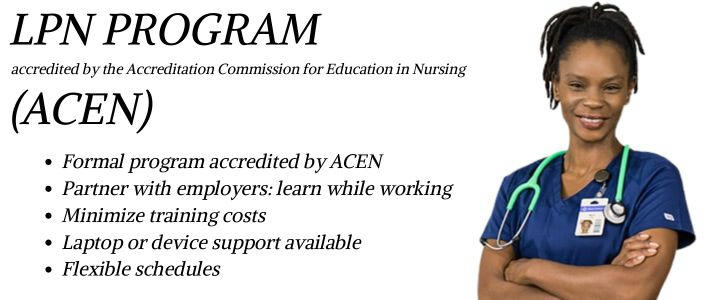A practical path to becoming a nurse practitioner: designed for working adults
Accredited formal program | Partner with employers: learn while working | Minimize training costs | Laptop or device support available | Flexible schedules
In the United States, career-oriented LPN programs are now designed to support adult learners—accredited formal programs that require no prior experience, offer recognized credentials, provide practical job assistance, flexible learning formats, and the tools needed to succeed from day one.

Is This a Recognized and Credentialed Path?
Yes. These programs are aligned with national healthcare standards and approved by professional licensing boards. Graduates are fully eligible to sit for the NCLEX-PN exam, and many programs report high pass rates—often above 95%, reflecting strong academic and clinical preparation.
Credential Support Highlights:
- Meets national and state licensing requirements
- Provides preparation for NCLEX-PN licensure exam
- Track record of strong exam pass rates
- Courses designed with real-world healthcare settings in mind
Programs that work with employers to enable simultaneous learning and work
Absolutely. Designed with working adults in mind, these programs offer flexible learning models—including online coursework combined with in-person clinical practice. This allows learners to maintain a job or family responsibilities while progressing through the curriculum.
Flexibility Features:
- Hybrid learning (online theory + local clinicals)
- Options to attend part-time or full-time
- Opportunities to work while studying
- Specific partnerships with healthcare providers offer opportunities to learn while working
How Are Training Costs Made More Accessible?
Students often receive significant financial support through workforce development partnerships, industry training initiatives, or education-focused public programs. These options help reduce personal costs and expand access for those facing economic barriers.
Affordability Support Includes:
- Tuition assistance based on eligibility
- Employer-supported or partner-supported training
- Cost-saving incentives for in-demand career tracks
What If You Lack Learning Equipment?
Programs understand that technology access can be a barrier. That’s why many provide laptops or other learning devices to ensure every student can participate fully—whether attending online lectures or submitting assignments remotely.
Technology Support Includes:
- Laptop provision for qualifying students
- Mobile-friendly learning platforms
- Tech assistance and remote learning support
- Software tools included for clinical documentation practice
Will You Be Supported Into the Workforce?
These programs meet national healthcare standards and are approved by professional licensing boards. Graduates are fully eligible to take the NCLEX-PN exam—with pass rates typically exceeding 95%, reflecting strong academic and clinical preparation.
Career Support Services:
- Clinical placement during training
- Dedicated job placement assistance after graduation
- Resume/interview coaching and job board access
- Employer networks seeking LPN-certified graduates
Is It a Smart Choice for Career Switchers?
Definitely. With a condensed training timeline (typically under 12 months), clear job outcomes, and growing demand for LPNs nationwide, this path offers immediate value. Whether you're reentering the workforce or transitioning from another field, these programs are built for progress.
Summary of Key Advantages
| Benefit Area | Features |
|---|---|
| Credential Support | NCLEX-PN prep, strong pass rates, board-approved curriculum |
| Work-Compatible | Hybrid learning, flexible pacing, part-time-friendly |
| Cost-Accessible | Training assistance, institutional support, no extra material fees |
| Tech-Ready | Laptop/device access, mobile learning platforms |
| Job-Focused | Internship or clinical placement, career coaching, employer connections |
LPN Program Suitability by Age Group: Motivation, Strengths, and Career Fit
| Age Group | Common Characteristics | Learning Motivation & Goals | Strengths & Suitability |
|---|---|---|---|
| 18–25 years | Recent graduates, exploring career paths | Quick employment, gaining experience, potential RN progression | Ample time, fast learners, adaptable to new environments |
| 26–35 years | Career changers, seeking income stability | Stable job, improved quality of life, career transition | Goal-driven, responsible, can leverage previous work experience |
| 36–50 years | Balancing family and work responsibilities | Second career, turn caregiving into a profession | Mature, resilient, rich life experience |
| 50+ years | Looking to stay active, serve the community | Purposeful work, meaningful use of time, helping others | Strong communication, empathy, deep interpersonal skills |
Common Admission Requirements:
- Must be 18 years or older
- Legal residency or work eligibility in the U.S.
- High school diploma or GED equivalent
- Basic English literacy and math skills (placement tests may be required)
- Physical ability to perform basic nursing tasks (e.g., lifting, standing, assisting patients)
- Clean background chec, especially regarding healthcare-related offenses
How to Apply
- Explore available programs through state nursing boards or adult training portals
- Submit an application online with required documents (e.g., ID, diploma, proof of residency)
- Complete assessments if applicable (language, math, or aptitude tests)
- Attend an info session or interview if requested by the program
- Wait for confirmation and receive enrollment instructions if accepted
This is not just training—it’s a practical launchpad. With the right program, you’ll get the credential support, cost flexibility, job placement, and technology access you need to become a licensed practical nurse with confidence.
